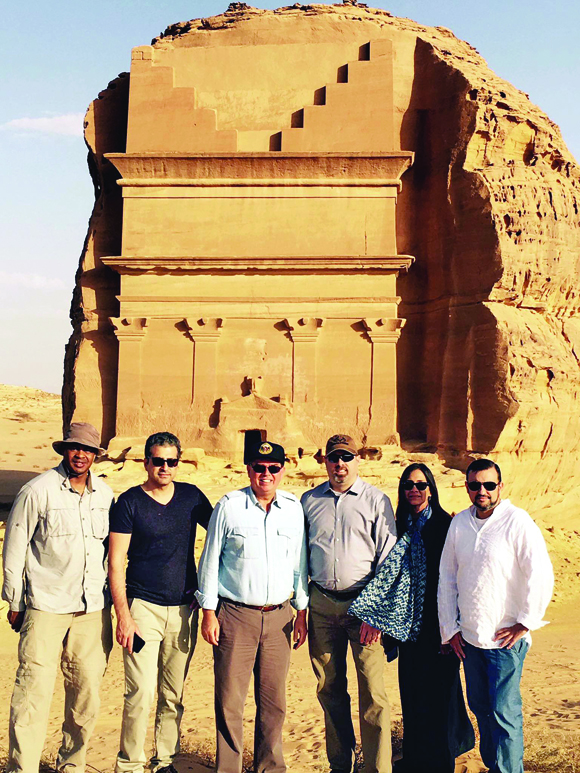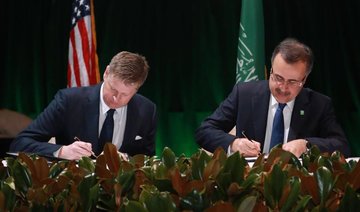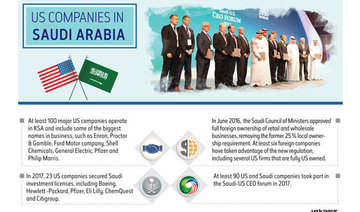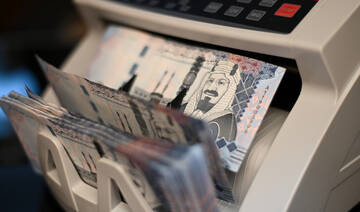Matthias J. Mitman could not have imagined what was in store when he arrived in Saudi Arabia two years ago to take up his post as the US consul general in Jeddah.
“I did not anticipate the degree to which change would occur in the Kingdom when I came here in 2016,” he said.
“The changes have been very rapid. I think they have been welcomed by the vast majority of Saudis, so it has been more than I expected. I think we have developed a very good and solid relationship with our Saudi counterparts, and that has been very useful and productive.”
Mitman’s job as a diplomat meant that he had a ringside view of these momentous changes. He took time out from his preparations to leave the country — now his posting is almost over — to welcome Arab News to his residence in the US Consulate in Jeddah’s Al-Ruwais district.
During an exclusive interview, he reflected on his time in the Kingdom and shared his thoughts about an eventful assignment, his impressions of Crown Prince Mohammed bin Salman, and his views on the Saudi people — in particular the youth.
“It has been a very dynamic and interesting period,” he said. “The Saudi Arabia that I came to two years ago is not the Saudi Arabia we are living in today. Crown Prince Mohammed bin Salman has put into place his Vision 2030, which has resulted in remarkable changes in the economic landscape, as well as in the cultural and social environment.
“I feel very fortunate to have served here in a period when there has been more change than perhaps in any other period in Saudi Arabia.”
Mitman said the crown prince had impressed him with his leadership, his vision for the country, and his ability to strategically plan its implementation.
“I have met (the crown prince) and I think he is a very dynamic leader,” he said. “He has a vision for the future of Saudi Arabia. He thinks strategically and he is dedicated to formulating a plan to bring about that vision. He wants to work closely with the United States so we have worked very closely with him on a number of issues related to Vision 2030.
“I think he captures some of the dynamism that exists within Saudi Arabia — and because the majority of the Saudi population is under the age of 30, that is captured by the support they give to the crown prince.”
Mitman met many young Saudis during his posting, an experience that gives him confidence for the future of the country.
“I am very impressed with young Saudis who are interested in working in the private sector, their use of technology, and the fact that they are so familiar with what is going on everywhere,” he said. “I have been very impressed with how knowledgeable they are about world affairs, politics, international trade, and their interest in studying in the United States.”
Among the many changes that Mitman has witnessed in the past two years, a few stick out as particularly noteworthy.
“One of the reforms that I have seen is the promotion of the private sector as an engine of growth in Saudi Arabia,” he said. “The Saudi economy was traditionally dependent upon the export of hydrocarbons — oil and gas. Graduates at one time expected to work for the government, and what I have now seen is a vibrancy, dynamism and entrepreneurship, especially in young people who are interested in forming their own companies and businesses. These will be small- and medium-sized enterprises — and in any economy the engine of growth for job creation is people who start out as small businessmen.
“Apple, Google and Microsoft started out as small companies with one or two people, and in many cases they were working in their garages. Yet now they employ hundreds of thousands of people, and the net worth of a company such as Apple is approaching $1 trillion in capital value. That is what the private sector can do.
“But the basis of that really is individual entrepreneurship and starting out with your own company, which grows from an idea that uses technology. I see a very strong interest in this among young Saudis. They are very technologically sophisticated. I think that is a very positive sign for the future of the Saudi economy as they will be able to form companies.”
Ultimately, Mitman said, the Kingdom’s most valuable resource is not oil, but its people. As such, the empowerment of Saudi women is a crucial development.
“I have visited universities in Madinah, Tabuk, Taif and Abha and I have seen the majority of students are women,” he said. “These women are a tremendous human resource that is skilled, talented and educated.
“I think one of the most profound changes is the one that enables women now to enter the labor force more easily, with greater flexibility, and part of this is a greater understanding of what is necessary to facilitate women working in the private sector.
“There is also the transportation issue, and we saw this week women getting their driving licenses. Thus you see a process by which women will have greater independence, freedom to drive themselves, and that will facilitate their being able to work and their entering the labor force.”
This, he said, “will have very positive long-term benefits for the Saudi economy.”
A career diplomat with the Senior Foreign Service, Mitman arrived in Jeddah in August 2016. He speaks Greek, Russian, Spanish and some German, and is a distinguished graduate of the National War College, earning an MA in National Security Studies in 2006.
Prior to his career with the State Department, he was an assistant professor of economics at Ball State University.
Before arriving in Jeddah, he was consul general in the Iraqi cities of Irbil and Basra. Earlier in his career, he worked at the US embassies in Tegucigalpa, Honduras, and Moscow.
“Coming (to Jeddah) as consul general was my first assignment here and my first trip to Saudi Arabia,” he said. “Jeddah was a new experience for me and one which I thoroughly enjoyed.”
Tourism is an important area that the Saudi authorities are keen to develop and promote as part of Vision 2030, and Mitman believes that the Kingdom has plenty to attract visitors.
“The United States is well-known for its natural beauty,” he said. “Equally, Saudi Arabia has natural attractions and I have visited several of them. I think Madain Saleh is clearly outstanding, and from an archaeological and historical standpoint it is one of the most interesting sites that I have seen. I think it has tremendous potential for tourism development.”
There is no shortage of opportunities, he said, to develop and promote the Kingdom’s natural beauty.
“I have gone up to Tabuk and along the Red Sea coast, where there are two of the projects launched by the Crown Prince — Neom and the Red Sea Project. I think both have tremendous potential,” he said. “I own a condominium in Florida, on the state’s Atlantic coast, and the area on the Red Sea is much more beautiful. There is the potential to attract people who want to go scuba diving or who just want to go to the beach.
“I think there are lots of opportunities in Saudi Arabia and I believe this is one of the crown prince’s priorities, which he has outlined. I think it will take some investment in infrastructure, and US companies have a lot of experience along those lines.
“I think they will be interested in being part of the hospitality or travel industry, or any industries that facilitate tourism.
“We already have about 75 travel agencies in the US that organize trips for Americans to come here for Hajj and Umrah, so we are talking about more than 20,000 people from the US who come here every year for religious journeys. The same skills and knowledge in arranging those trips can be used to arrange tourist trips that will appeal to Americans.
“Most Americans have never traveled to Saudi Arabia. In the past it was somewhat of a challenge to get a tourist visa, but I think the Saudi government is now looking at ways to make the process easier to facilitate tourists coming to the Kingdom.”
As part of his work, Mitman met religious leaders and reported back to Washington on evolving attitudes, to give policymakers a more accurate present-day view of the country.
“I have had very positive and productive discussions with the religious leaders about Islam and I have come away very impressed with their level of tolerance and their emphasis on moderation in the practice of Islam,” he said.
“I have also been impressed by their understanding of the importance of having friendly relations with Americans. We have about 3 million Muslims living in the United States and there are several thousand mosques there. We brought the imam of one of the Washington, DC, mosques to Saudi Arabia to conduct workshops and to talk about Islam as it is practiced in the United States. He also performed Umrah while he was here.
“We are always looking for ways in which we can help people understand that we promote freedom of religion in the United States … that is an integral part of what it is to live in America. Many of the first settlers who went to the US hundreds of years ago went there because they faced religious persecution in Europe, and they wanted to go somewhere where they could practice their religion freely.”
With so many professional obligations, time for recreation was perhaps limited, but Mitman fondly recalls a few highlights.
“I enjoyed going out on a boat along the coast and snorkeling,” he said. “I enjoy swimming. I have visited a number of cities. In Taif I walked along the mountains and saw the baboons — I never realized there were baboons in Saudi Arabia. And I visited some of the museums that feature Saudi history and show the cultural development of the Kingdom.”
Mitman said he is also a big fan of art and had enjoyed exploring Jeddah’s “very vibrant artistic community, with world-class galleries.” He added: “We have worked closely with the Saudi Art Council, chaired by Princess Jawaher (bint Majed bin Abdul Aziz), in bringing Arab-American artists such as Helen Zughaib here and holding an exhibition of her work.”
With the reopening of cinemas and the Kingdom’s recent participation for the first time in the Cannes Film Festival, it is fitting that Mitman also enjoyed a professional visit by American filmmakers.
“We brought people from the Hollywood film industry here who are producers and writers and they gave workshops,” he said. “This is important as Saudi Arabia is now creating its own entertainment sector. One of the areas will be film production — and producing films about Saudi Arabia directed by Saudis, acted by Saudis — and so we brought in two Hollywood experts. They went to Effat University, where there is a course in filmmaking, and this was something that I enjoyed a great deal.”
As his time in Saudi Arabia draws to a close, there are memories Mitman will carry with him.
“I have been invited into Saudi homes during the month of Ramadan, which is a very special month for all Muslims,” he said. “I have been taken into the homes of many Saudi contacts who have become close friends and who invited me to break the fast and to stay up much later for sahoor. On some nights, I have had iftar in one house and sahoor in another.
“Those have been special moments because Saudis have opened up their homes and shown me great hospitality. I am not a Muslim but they allowed me to participate and be a part of their celebrations. Those have been very special moments for me as I was away from my family. My wife works in the State Department in Washington and we have two adult children, both of whom are working (abroad).”
During times of change the role of a healthy media is to monitor and report on events truthfully and fairly. Mitman believes Arab News has a key part to play in this.
“I think Arab News plays a very important role in reporting developments in Saudi Arabia for the expatriate communities and for people who don’t read Arabic,” he said. “It is one of two newspapers that I read every morning.
“I have an excellent relationship with Editor in Chief Faisal Abbas. I saw him regularly and we exchanged ideas and had conversations about what was going on in Saudi Arabia.”
Mitman has a few parting thoughts for Americans and Saudis, based on his time in the Kingdom.
“For the Americans, I would say if you haven’t visited Saudi Arabia recently you might be pleasantly surprised with the natural beauty, the attractions, and the warmth and hospitality of the people,” he said.
“To Saudis, I would say thank you for hosting me and allowing me to live for two years in your country. I am grateful for the friendships that I made with many Saudis who helped me to build a bridge between America and the Kingdom. And I thank them for the great cooperation between our two countries in economics, trade and investment.
“Many Americans are interested in investing in Saudi Arabia and many Saudis are interested in investing in America. The exchange of goods and services between our two countries will continue to grow.”

Outgoing US Consul General Matthias Mitman, third left, during a visit to Madain Saleh. (Photo/Supplied )















